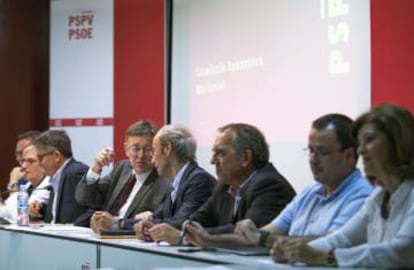Spanish king to hold new round of talks in bid to form government
Investiture session could be held on October 26 or 27, just in time to meet the deadline


Spain’s King Felipe VI will begin a new round of talks with political leaders on October 24 and 25, the acting government confirmed on Tuesday.
These talks are aimed at establishing whether any candidate stands a chance of becoming the next prime minister – a position that will be decided at a subsequent investiture vote in Congress.
The political calendar mandates that this session must be held before October 31, or the country will automatically go to a new national election. If so, it will be the third in a year, and polls are forecasting low turnout and a similarly fragmented outcome as Spaniards become increasingly weary of their bickering politicians.
The only politician who stands a chance is Mariano Rajoy, who has been heading a caretaker government since 2015
If the monarch’s talks with party leaders suggest there is enough support for any one candidate, the investiture session could be held on October 26 or 27, with a second run-off vote held on October 28 or 29, just in time to meet the deadline.
In practice, the only politician who stands a chance is Mariano Rajoy of the Popular Party (PP), who has been heading a caretaker government since the first inconclusive election of December 20, 2015.
So far, Rajoy has been unable to attract enough support from other parties to get himself reinstated, leading to a 10-month stalemate. But the recent resignation of the head of the Socialist Party (PSOE) means that the main opposition group might be open to an abstention at the investiture vote, a move that would effectively deliver the position to Rajoy.
The Socialists are still split between those who favor abstention and those who oppose it. If the latter prevail, Rajoy would lose the investiture vote and a new national election would be inevitable.
On Tuesday, congressional speaker Ana Pastor met with the king and announced that she would speak to party leaders later that day. On October 20, she will send Felipe VI a list of the representatives who will meet with him on October 24and 25.
The Socialists are still split between those who favor abstention and those who oppose it
Meanwhile, acting Prime Minister Mariano Rajoy is getting used to the idea that even if he succeeds in being reinstated after a 10-month stalemate, his Popular Party (PP) will need to change the way it does politics.
And he is conveying that fact to his fellow party members. Last weekend, Rajoy told a meeting of senior PP officials that even in the event of continuing in office for a second term, the new government will have to show “patience and humility” because it will be very much alone.
The new fragmented scenario that emerged out of the December 20 elections, thanks to the appearance of the left-leaning anti-austerity Podemos and the center-right Ciudadanos, and then again at the repeat vote of June 26, means that the PP does not have the kind of absolute majority it has enjoyed in the past. Nor has it managed to strike any enduring deals with other parties that might ensure stability during the legislative term.

Instead, a hypothetical Rajoy administration would have to reach vote-by-vote arrangements in Congress with opposition parties, some of which, like the Socialist Party (PSOE) and Podemos, are battling each other for hegemony over the political left while dealing with internal battles of their own.
In the new, uncertain scenario unfolding in Spanish politics, Rajoy’s chief strategy seems to be to tread lightly and try not to put his foot in it. He has already told PSOE leaders to take their time to decide on the issue that is ripping the main opposition party apart: whether to vote against Rajoy at an investiture session in Congress, or whether to abstain, thereby passively delivering the government to him.
If there is no renewal within the PP we will not enter into a coalition government
José Manuel Villegas, Ciudadanos
Even if abstention wins the day, the PSOE has already warned that it will not enter into a governing coalition with the PP. Alternately, if the Socialists vote down Rajoy at the investiture vote, the country will automatically go to a third election in December.
Meanwhile Ciudadanos, which has alternately attempted governing deals with the PSOE and the PP, will also refuse to enter into a coalition with Rajoy in the light of the Gürtel corruption trial that got underway last week. The PP is hoping for favorable rulings that might convince Ciudadanos leader Albert Rivera to back the conservatives sometime in the future.
All options open
Rajoy and his team have been reiterating that they remain open to all types of collaboration “with the PSOE and other parties.”
“I think all three parties have a lot in common,” said Pablo Casado, the conservative spokesman, about the PP, PSOE and Ciudadanos.
For now, however, Ciudadanos leader Rivera keeps insisting that his party will not govern with Rajoy because of his association with Gürtel and other high-profile corruption cases like the executive credit cards at Caja Madrid, which is also at the trial stage.
“If there is no renewal within the PP we will not enter into a coalition government,” warned Ciudadanos vice-secretary general José Manuel Villegas. “Rajoy is a master of maintaining the status quo.”
English version by Susana Urra.
Tu suscripción se está usando en otro dispositivo
¿Quieres añadir otro usuario a tu suscripción?
Si continúas leyendo en este dispositivo, no se podrá leer en el otro.
FlechaTu suscripción se está usando en otro dispositivo y solo puedes acceder a EL PAÍS desde un dispositivo a la vez.
Si quieres compartir tu cuenta, cambia tu suscripción a la modalidad Premium, así podrás añadir otro usuario. Cada uno accederá con su propia cuenta de email, lo que os permitirá personalizar vuestra experiencia en EL PAÍS.
¿Tienes una suscripción de empresa? Accede aquí para contratar más cuentas.
En el caso de no saber quién está usando tu cuenta, te recomendamos cambiar tu contraseña aquí.
Si decides continuar compartiendo tu cuenta, este mensaje se mostrará en tu dispositivo y en el de la otra persona que está usando tu cuenta de forma indefinida, afectando a tu experiencia de lectura. Puedes consultar aquí los términos y condiciones de la suscripción digital.








































